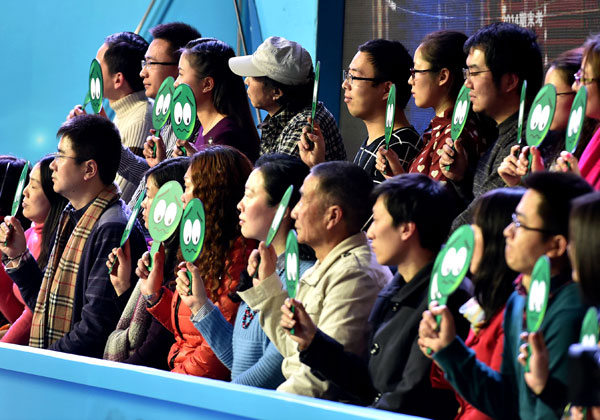 |
| People from all walks of life are invited to assess the officials' performances. Chen Jianhua / Provided to China Daily |
Usually, the program lasts about two hours: The undercover videos are screened first, and then the relevant officials respond to questions from the anchor, media representatives, commentators and the general audience.
Officials in Wuhan attach great importance to their appearances on the show, and some ask colleagues to play the role of a TV host while they rehearse answers to the questions they may be asked.
Appearing on the show is a nerve-wracking experience, according to Wang Taihui, Party chief of Qiaokou district: "To tell the truth, I was very nervous when I got the invitation. I was really worried about my performance because I would not just be representing myself, but also the district. A poor performance would cast a poor light over all the officials in the district. All the officials are well-prepared before the program. I was as well. However, my preparations didn't involve practicing skills to please the audience. Instead, I fully reviewed the problems we had promised, but failed, to solve, and discovered the reasons and some solutions."
Wang said he thought he would be nervous on the stage, but he calmed down very quickly, and wasn't intimidated by the questions because he had studied the details of every project in every district and was able to call up the information at will.
"People need to see sincere officials, people who are brave enough to shoulder their responsibilities. We need to see this program as a chance to review problems in our work and find ways to improve. The questions are not meant to humiliate the officials, but to help solve problems," he said.
Supervision platform
Not only has the program been a big success in Wuhan, it's also gained attention nationwide. That success prompted more than 80 broadcasters to visit WHTV to experience the show firsthand, and now similar programs are shown in provinces as far-flung as Hubei, Hunan, Guangdong, Henan, Shandong and Shaanxi.
To differentiate themselves from Dianshi Wenzheng, some stations have tinkered with the format, such as the broadcaster in Shangnan county, Shaanxi province, that moved the program to the county square to boost audience numbers. Meanwhile, in an incident that both shocked and delighted viewers, a top county health official named Hua Zhongyang was fired on live TV as he buried his face in his hands and wept.
Although the move was popular with viewers, experts warned that it was sensationalist, and did not accord with the official procedure for appointments and dismissals.
Changes underway?
"We hope to make use of the platform to publicly supervise the change in officials' work methods. Four years have passed, and under such close and powerful supervision, many officials have changed the way they work, willingly or unwillingly," Che Yan'gao said. He added that to the public, Dianshi Wenzheng is just a TV show, but to local administrators it's a platform for supervision and assessment.
Each live broadcast is a comprehensive assessment of an official's capabilities, problem-solving abilities, sense of responsibility, analytical and summarizing skills, and the ability to think about a problem from the viewpoint of the public, he said.
"The pressure of appearing on live TV shows is forcing officials to work harder, and go to the grassroots to solve problems. Gradually that will become their accepted style of working," he added.
Wang said that rather than being afraid of the program, he finds it hard to resist joining in. "Officials generally live in a very closed, small circle. We need to know more about the public's views, and the public should also know more about us, including what we have done, our thinking and our efforts," he said.
"The program provides an equal platform for both sides, and helps us to think from each other's perspective. The management of a city depends on the efforts of both officials and the public, not just some people issuing orders and other people following them," Wang said.
Normalized supervision
Zhou Ding, 65, a retiree in Wuhan, used the power of the program to complain about a local hospital where patients were routinely prescribed therapies and expensive medicines they didn't need.
"I called the TV station about the problem, and they contacted the hospital live on air. I got a refund from the hospital. I hope the officials will be able to solve the problems we report every day as easily as they did during the program," Zhou said.
Despite the program's success, Che Yan'sgao is not entirely happy: "We are concerned that the program can't be aired everyday. Immediate solution of problems should be the normal state of affairs, and we have ordered all our officials to monitor themselves and their work as if they were going on that live broadcast every day."
"We have also adjusted the marking process, and have increased the proportion alloted for officials' daily performances to 90 percent of the marks, so their performance on the program only accounts for 10 percent," he said.
Huang Hongyun, vice-president of the Wuhan Academy of Social Sciences, said the program is a good communication platform for officials and citizens, and will help improve relations between the two groups. Also, it encourages residents to participate in the management of their city, and sets a good example of democracy in action.
"So far, the program has proved to be the best way of testing officials' performances, and helping people to solve their problems," she said.
Contact the writer at hena@chinadaily.com.cn
Liu Kun and He Yizhou contributed to this story.
